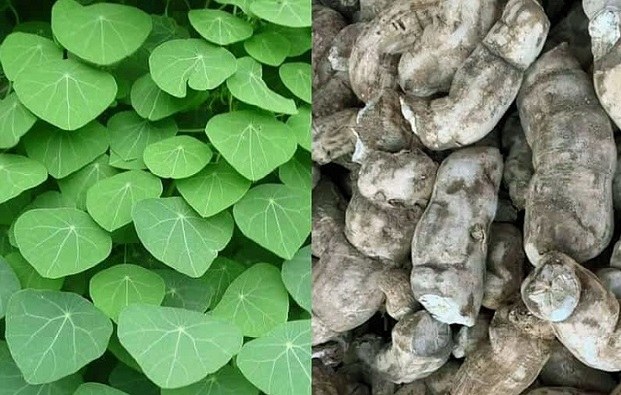Study Shows Chinese Herbal Compound Blocks COVID-19 Replication in Human Lung Cells
Nikhil Prasad Fact checked by:Thailand Medical News Team Jul 08, 2025 7 months, 6 days, 2 hours, 4 minutes ago
Thailand Medical News: Tetrandrine Found to Activate Autophagy and Disrupt Key Viral Pathways Including Cholesterol and IGF Signaling
A new study by an international team of researchers has found that Tetrandrine, a naturally occurring compound from traditional Chinese medicine, can significantly reduce the ability of SARS-CoV-2 to replicate inside human lung cells. The research was carried out by scientists from IRCCS Lazzaro Spallanzani Institute (Italy), Escola Paulista de Medicina at Universidade Federal de São Paulo (Brazil), University of Fribourg (Switzerland), and Tor Vergata University of Rome (Italy), in collaboration with other institutions.
 Tetrandrine, a phytochemical derived from the root of the Stephania tetrandra plant exhibits antiviral properties
Tetrandrine, a phytochemical derived from the root of the Stephania tetrandra plant exhibits antiviral properties
against the COVID-19 virus
The study focused on how Tetrandrine modulates autophagy—a vital process where cells break down and recycle their internal components—and how this modulation can be used to counter SARS-CoV-2 infections. This
Thailand Medical News report highlights the growing interest in repurposing naturally derived substances to address new viral threats like COVID-19.
How the Study Was Conducted
Using Calu-3 cells, a type of human lung epithelial cell commonly used in coronavirus research, the researchers tested two concentrations of Tetrandrine: 5 μM and 10 μM. They found that at the lower dose, Tetrandrine increased autophagy, while at the higher dose, it inhibited the final step of the autophagic process by preventing fusion of autophagosomes with lysosomes.
When the virus was introduced, both doses of Tetrandrine dramatically reduced the levels of viral genes (including the spike and envelope genes) in the cells. Pre-treatment with Tetrandrine proved even more effective than post-infection treatment. This suggests Tetrandrine might work best as a preventive therapy or very early intervention.
Notably, even when autophagy was artificially suppressed in the cells, Tetrandrine still blocked viral replication—indicating that the compound works through both autophagy-related and independent mechanisms.
Blocking the Virus Beyond Autophagy
The research also used proteomic analysis to dive deeper into how Tetrandrine affects infected cells. The scientists found that Tetrandrine disrupts key host cell functions that the virus relies on—specifically cholesterol metabolism and insulin-like growth factor (IGF) signaling.
These pathways are crucial because the virus uses cholesterol to enter and replicate within host cells. Similarly, IGF signaling has been linked to COVID-19 progression, particularly in diabetic patients. By interrupting these mechanisms, Tetrandrine may be interfering with the virus’s ability to thrive inside the human body.
Additionally, the study found upregulation of proteins like CST3 and SDC2—both known for their antiviral activity against other viruses like HIV
and herpes—after treatment with Tetrandrine, suggesting a broader immune-modulating effect.
A Multi-Targeted Approach Against COVID-19
The findings demonstrate that Tetrandrine works not just by enhancing autophagy, but also by disabling other cellular systems the virus hijacks to replicate and spread. This multifaceted mode of action makes it an attractive candidate for future drug development against COVID-19 and possibly other viral infections.
Importantly, the antiviral effect was observed even with newer variants like Omicron BA.5, which continue to dominate global case numbers. Tetrandrine's ability to block replication in these strains, even when applied after exposure, raises hope for its potential as part of a post-exposure treatment strategy.
Final Thoughts
While these results are promising, the researchers caution that more studies, including animal testing and clinical trials, are needed to determine if Tetrandrine is safe and effective in actual patients. The compound’s dual action—targeting both autophagy and other viral-supportive pathways—suggests it could be a valuable addition to our antiviral arsenal. If proven effective, Tetrandrine could be especially useful for high-risk groups or as a preventive measure for those exposed to the virus.
The study findings were published on a preprint server and are currently being peer reviewed.
https://www.researchsquare.com/article/rs-6958516/v1
For the latest COVID-19 News, keep on logging to
Thailand Medical News.
Read Also:
https://www.thailandmedical.news/news/the-broad-antiviral-potential-of-the-tcm-decoction-fuzheng-jied-against-various-coronaviruses-including-sars-cov-2
https://www.thailandmedical.news/news/new-approach-to-combat-long-covid-with-traditional-chinese-medicine
https://www.thailandmedical.news/news/traditional-chinese-medicine-formulation-called-fufang-yinhua-jiedu-granules-shows-promise-in-covid-19-treatment
https://www.thailandmedical.news/articles/tcm-news
